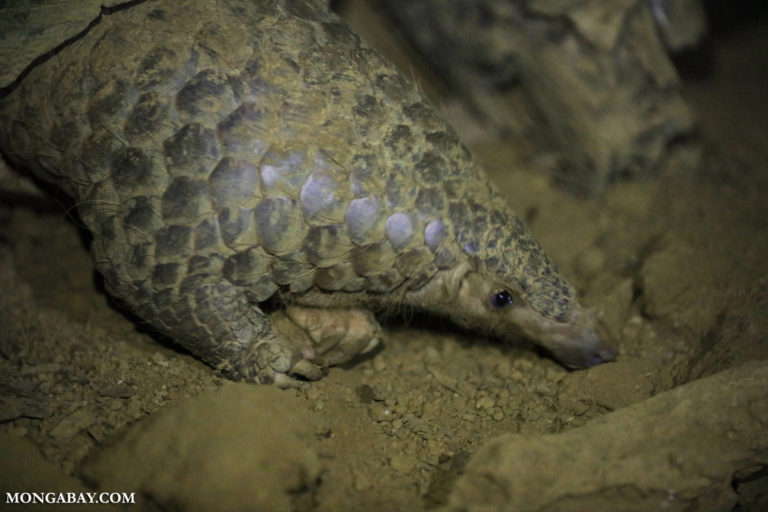News
2 months after, still no update on Vietnam wildlife trade ban

A pangolin at the Cuc Phuong National Park in Vietnam. Pangolins are widely traded for meat and use in traditional medicine. Image by Rhett A. Butler.
- In March, responding to the novel coronavirus pandemic, Prime Minister Nguyen Xuan Phuc requested draft legislation banning the trade and consumption of wildlife in Vietnam by April 1.
- That date has come and gone, but no information on the requested ban has been made public since March.
- Conservationists are concerned that Vietnam’s thus far successful containment of the coronavirus outbreak means the government is no longer prioritizing wildlife regulations.
- NGOs are still working, both behind the scenes and in public, to press the issue.
HO CHI MINH CITY, Vietnam – Conservation organizations in Vietnam sent a letter to the Prime Minister last week asking for an update on planned regulations curtailing the trade and consumption of wildlife.
In March, responding to the novel coronavirus pandemic, Prime Minister Nguyen Xuan Phuc directed the Ministry of Agriculture and Rural Development to draft a ban by April 1. This was partially in response to an open call that the same 14 organizations sent recommending a wildlife trade ban to prevent future viral epidemics. Experts believe that the current pandemic began when a virus jumped from a wild animal species to a human at a market in Wuhan, China.
While the consumption of wild animal meat is not widespread in Vietnam, it is relatively common in rural areas, and can be a status symbol among business and political elites. Nationally, the illegal wildlife trade, which includes everything from sea turtle shells and tiger bones to bear bile and pangolin scales, is worth at least $1 billion, though an exact figure is difficult to determine given the nature of the trade. Vietnam is also home to numerous legal wild animal farms, a loophole that conservation groups have been working to close.
Thus far, China is the only country to have implemented a large-scale ban on the wildlife trade in response to the pandemic, though loopholes exist there as well. Most recently, the Chinese government announced that it would start offering farmers cash to end the breeding of exotic animals.
Since March, Vietnam has largely contained its coronavirus outbreak, with no community transmission detected in over one month and schools, businesses and domestic tourism reopening. World Health Organization statistics show 325 confirmed infections and zero deaths.
While this is outstanding news for public health, conservationists fear the government has lost focus on the wildlife issue, and there have been no public updates on the ban since March.
“The prime minister’s directive now seems to be just a beautiful dream,” said Hong Hoang, founder and executive director of CHANGE Vietnam, an environmental NGO based here. “Let’s dream on!”
Multiple experts at other organizations, who spoke on background in order to preserve their working relationships with officials, said there has been no discernible progress since a draft regulation was shared several weeks ago. These groups expected to advise the agriculture ministry on a ban, but this has not occurred. The ministry did not respond to a request for comment.
Nonetheless, conservationists are still pushing for a ban.
“Risk of viral transmission from wild mammals and birds to humans increases when live animals and fresh meat come into contact with people in locations such as markets and restaurants,” said Benjamin Rawson, conservation and program development director of WWF-Vietnam. “This is true regardless of whether the animals are legal or illegal to trade, and therefore the Prime Minister’s directive needs to mitigate risk of future viral epidemics both through improved enforcement of existing laws and effective judicial penalties for those who break them, but also through serious assessment of risk in relation to wildlife farms.”
K. Yoganand, regional lead for wildlife and wildlife crime at WWF Greater Mekong, said legal systems around wildlife need to be improved throughout Southeast Asia: “Currently, wildlife trade laws of most countries do not factor in infectious disease risks. This is a major gap in policy. To minimize viral epidemic risks, all commercial trade in wild animals and birds needs to be suspended by governments, to be followed by a scientific assessment of which groups of wild animals are at high risk of carrying viruses that can be transmitted to people.”
CHANGE, for its part, is continuing work toward a ban. Hong said her team convinced four members of the National Assembly, Vietnam’s legislative body, to speak to domestic media about the importance of ending wildlife trade and consumption. It also began an awareness-raising campaign called The Host to educate the public about links between wildlife and new infectious diseases. According to Hong, the first video, titled “The Call of the Wild” in English, has over 4 million views on Facebook and over 3.5 million views on YouTube. The closing message is “Stop using wildlife for a better/safer future.”
[This article was originally published by Mongabay. READ: Vietnam wildlife trade ban appears to flounder amid coronavirus success]





















